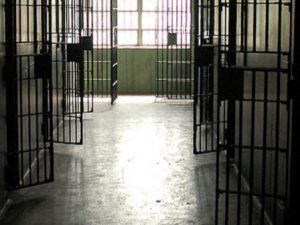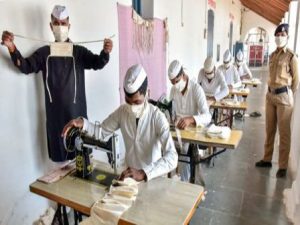Jails in Corona Times: Conditional Parole for Prisoners
As prisons function as places to keep ‘anti-social’ elements out of society, one wonders since 69 per cent inmates are currently under trial, whether the claim is true at all.

Countries have been freeing their prisoners in jails on emergency paroles or interim bail due to the onslaught of coronavirus pandemic Countries like Iran have released approximately 80,000 prisoners. Similarly, prison visits have been cancelled in England and Whales. New York, California and Ohio were among the first US states to release incarcerated people. Yet, on the other hand, Saudi Arabia has put forth a punishment of imprisonment for the citizens not following the lockdown. In India, the Supreme Court ordered formation of a high power committee to work with the Legal Services Authority of the respective states to decide upon the release of prisoners.
State of Prisons
Prisons, especially in India, are overcrowded spaces. Their occupancy is 117.6 per cent, and all of them feature visitors and lawyers entering the premises with high frequency. Many times, prisons are not hygienic, owing to space constraints and other factors like provision of basic sanitation and healthcare. Given these, there is a high propensity of prisons becoming centres of community outbreaks.
Rule 13.73 of Model Prison Manual, 2016, provides for elaborate guidelines concerning the steps, which are required to be taken by the prison authorities. These guidelines include provisions such as segregated sheds for every prisoner to carry out social distancing effectively, the detention of infected prisoner in a separate building which is away from all other inmates and proper treatment of patient’s clothing and infected barracks. In addition to the Model Prison Rules, 2016 the Delhi Prison Rules 2018 provides for similar action to handle epidemics in prisons.
Also Read : Police Reforms In India Need For A New Police Law
However, these provisions have become irrelevant because of overpopulated prisons. A classic example is that of Delhi’s prison, which is one of the most overpopulated prisons in the country. With a maximum capacity of 10,000 prisoners, Delhi houses nearly 17,500 prisoners. Following the recent Supreme Court order, the high-powered committee directed the release of up to 3000 prisoners.
The situation remains grim, as even after the release of prisoners, Delhi jails will be overpopulated by nearly 4500 prisoners.
A similar situation prevails in Uttar Pradesh, which has a total of 70 jails, with the capacity to house 58,400. However, as per the Prison Statistics Report, 2018 there are about 96,383; the occupancy rate being 165 per cent. The high-powered committee in Uttar Pradesh has ordered the release of 11,000 prisoners, including detainees released under the Public Safety Act. However, even after the release of such high volume of prisoners, the prisons in UP remain overcrowded.

In a move to decongest prisons in Maharashtra, especially after the outbreak of coronavirus in Arthur Road jail that has infected at least 184 prisoners and 26 jail officials, a high power committee on decided to release 50 per cent of the total 35,239 inmates across the state prisons.
Mental Health of Prisoners
While the provisions of the Model Prison Manual, 2016, regarding the containment of epidemics remain infructuous, there exists a more worrying situation, i.e., the issue of mental health of prisoners. Reports suggest that even in normal times mental health of the prisoners remains weak in prisons. In times of pandemic, things become worse. This is because case hearings before different judicial forums have been significantly reduced and families of prisoners have been asked to refrain from meeting the inmates. Jail authorities have also reduced movement of prisoners and have cancelled all social activities– thereby completely isolating prisoners in jails. Although, this is the need of the hour, this makes prisoners more vulnerable to mental health disorders.
Plight of Freed Prisoners
A story covered by BBC talked about the trauma and stigmatisation faced by the prisoners who are released on paroles from jails in the middle of the country’s grinding lockdown to curb the spread of COVID-19.
Many prisoners, who are eligible for bails, are not able to avail one because their families are unable to pay the required amount due to their economic conditions.
Also Read : Justice Delivery Maharashtra Tops While Up Bihar At The Bottom
Some prisoners who are lucky enough to be freed, no one comes to pick them up. Travelling all the way to their homes is not possible for them, and those who somehow manage to reach their villages or cities face a lot of stigmatisation from their neighbours if they live in apartments or densely populated slum areas.
Most prisoners are also from economically weaker backgrounds. Jails are no exception to the power dynamics that flourish in society. From being able to swiftly afford and avail bail to legitimate preferential treatment inside the prison, richer inmates can manoeuvre their way through jail systems with ease. The Law Commission highlighted how the influential and powerful can obtain bail easily, while the poor masses or the common people languish in prisons.
Given the classist nature of prisons, inmates are more often than not people stuck in the web of the system due to socio-cultural-economic identities. Their place in society makes it tough for them to defend themselves legally and financially. Although legal aid systems attempt at helping them out, the ground reality proves to be far from ideal. Apart from this, administrative or preventive detention is used by authorities to detain individuals without having to deal with due process of law. There were 2384 detenues in prison in 2018.
As prisons function as places to keep ‘anti-social’ elements out of society, one wonders since 69 per cent inmates are currently under trial, whether the claim is true at all. Especially in the light of the fact that the Supreme Court has allowed for parolees, albeit in an exceptional circumstance, prisoners are let out back into society for the time period.
